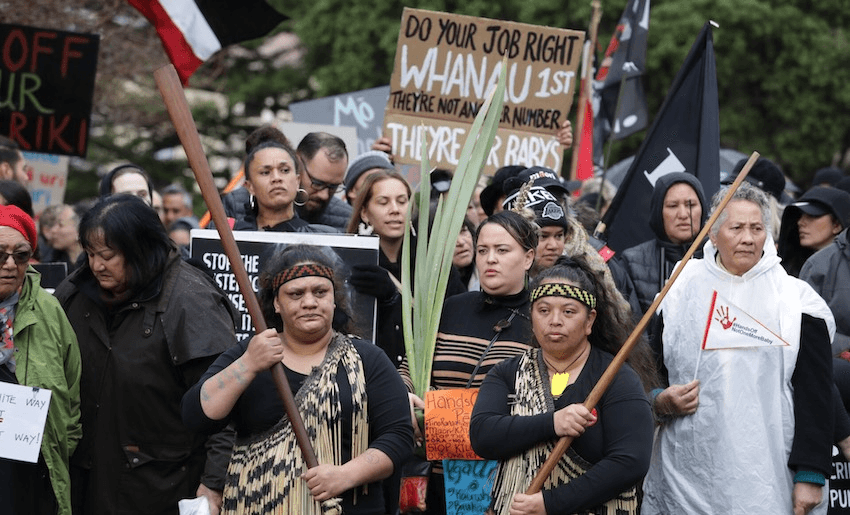The Waitangi Tribunal has released its urgent inquiry into Oranga Tamariki, concluding that the Crown’s care and protection system has breached te Tiriti o Waitangi. Charlotte Muru-Lanning explains.
What’s this inquiry about?
Oranga Tamariki, the government department tasked with ensuring the care and protection of vulnerable children, faced public scrutiny following a 2019 Newsroom investigation that featured footage of a newborn Māori baby being uplifted from its mother at a maternity ward. Various reports and inquiries resulted, including this one, which the Waitangi Tribunal gave urgent status, noting “tamariki Māori were suffering or likely to suffer significant and irreversible prejudice as a result of the current or pending actions of Oranga Tamariki”.
Oranga Tamariki was created in 2017 to replace Child, Youth and Family (CYFS) after an expert advisory panel found, in 2015, that it wasn’t meeting the needs of vulnerable children and young people.
There were three main issues the Waitangi Tribunal inquiry covered:
- the causes of the over-representation of tamariki Māori in state care,
- whether the changes made in 2017 are likely to remedy that over-representation
- what further changes might be required in order for the Crown to uphold its obligations under Te Tiriti o Waitangi and its principles
The tribunal received 51 claims between November 2019 and July 2020 from individuals, whānau, hapū, iwi, and other entities including trusts, district Māori councils and rūnanga.
What did the report find?
The tribunal found that disparity in outcomes for Māori is in part a result of the effects of alienation, dispossession and ongoing Crown efforts to assimilate Māori to Pākehā ways of life, and that these poor outcomes for tamariki Māori reflect the Crown’s failure to honour tino rangatiratanga guaranteed to Māori in te Tiriti of Waitangi. It also found that there have been breaches of the principles of partnership, active protection and options. Notably, the tribunal found the changes made in 2017 that created Oranga Tamariki were not enough to realise the type of transformations necessary to achieve a te Tiriti-consistent future in Aotearoa.
What are the Waitangi Tribunal’s recommendations?
The primary recommendation is that the Crown steps back from further intrusion into what was reserved to Māori under Te Tiriti, and a Māori Transition Authority independent from the Crown and other departments is established. This authority’s primary function would be to identify the changes necessary to eliminate the need for state care of tamariki Māori.
The report does not support calls for the abolition of Oranga Tamariki, saying that “for at least the foreseeable future we see a role for an Oranga Tamariki statutory social worker, backed by the state’s coercive powers, in cases where a Māori organisation meets resistance to an intervention considered necessary for the safety of a child or children”.
In the report, presiding officer Michael Doogan says “we refrain from overly prescriptive recommendations and instead place emphasis upon the process by which Māori can lead the transformation”.
“While we accept that a significant transformation is required, we do not see it as simply a case of calculating and transferring to a new Māori organisation proportionate responsibility and resource from Oranga Tamariki,” says Doogan. “Such an approach risks transferring a number of system problems and also runs the risk of diverting focus onto resourcing issues before system design is properly worked through.”
So, they’re not calling for Oranga Tamariki to be completely disestablished?
Correct.
What would the Māori Transition Authority do?
Its primary function will be to identify the changes necessary to eliminate the need for state care of tamariki Māori. It would be “given a wide mandate to consider system improvements both within and outside of the legislative and policy settings for Oranga Tamariki”.
What would the Crown’s role be in this?
The Crown would play a supporting role, but “it is not one that it can or should lead”.
Has the Crown acknowledged any existing problems?
Some. In November last year, Oranga Tamariki ,on behalf of the Crown, formally acknowledged there were issues on behalf of the Crown. Including an acknowledgment of structural racism within the care system, a failure to properly implement the recommendations of 1988 report Pūao Te Ata Tū and that historically, Māori perspectives have been ignored in the care and protection system. However, the Crown believes the policy changes introduced in 2017 will change the disparity for the better, a belief fundamentally at odds with the claimants.
What happens next?
It’s up to the government to make changes. The Waitangi Tribunal isn’t a court of law, which means its recommendations and findings are not binding on the Crown. Though the government has faced criticism for not following the recommendations of the Waitangi Tribunal, the recent announcement of an independent Māori Health Authority following a damning 2019 tribunal report that outlined the failure of the Crown in Māori wellbeing is a sign of potential change to come.





